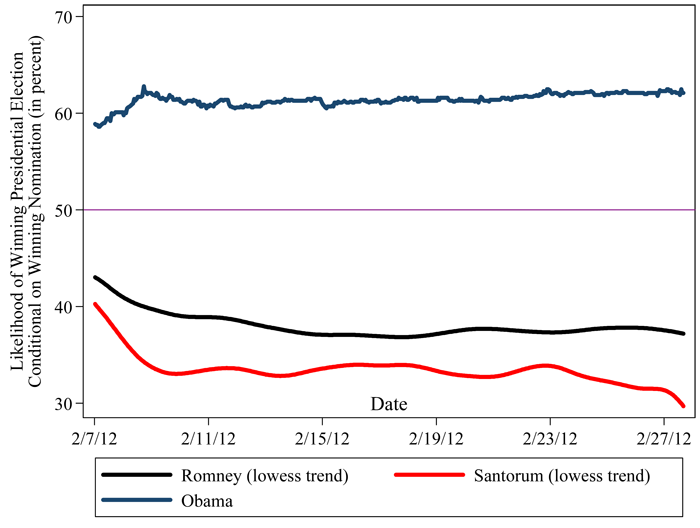As Republican nomination extends into March, candidates face weakening odds in general election
The longer-than-expected Republican primary has given many more voters a chance to meet the candidates and cast ballots in meaningful elections, but it has caused some in the party to worry that it is weakening the eventual winner in his confrontation with President Obama. Mitt Romney is still the heavy favorite to win the nomination, with 75.2 percent odds to Rick Santorum's 9.8 percent, but the data suggests he could be looking at a Pyrrhic victory. The president's odds of re-election jumped to above 60 percent in the days after Santorum's big wins on February 7, according to prediction markets. Since then they have steadily crept up; by contrast, Obama spent the fall and early winter hovering around 50 percent.
We can compute the Republican challengers' likelihood of victory against Obama, should they win the Republican primary, by dividing their likelihood of becoming president by their likelihood of winning the nomination. Because this is a "conditional probability" -- you can only win the presidency on the condition that you win the nomination -- the data is more erratic for potential Republican nominees than it is for Obama. That is why we take a trend of the data, and the curves you see below are smoother for Romney and Santorum than for Obama.
Sources: Betfair and Intrade. The chart assumes a 100 percent likelihood of Obama being re-nominated as the Democratic candidate in 2012. (See real-time data).
Romney's conditional likelihood of victory against Obama has continued to decrease since his primary troubles began. A portion of that decrease is the fact that any Republican nominee will have a harder time beating an incumbent with increasing economic growth and presidential approval approaching 50 percent. Another portion of that decrease is likely due to the fact that both candidates have increased exposure to gaffes and blunders as the nomination battle continues.
Santorum's conditional likelihood of victory against Obama has fallen precipitously in the last few weeks. Santorum's conditional likelihood of victory is falling faster than Romney's. This indicates that an even larger portion of Santorum's decline is due to his decreased electability relative to Obama's increased electability. (Santorum's favorable standing in the polls has drawn more attention to his position on religion in the public sphere, among other topics that may not appeal to a broad base of supporters.) The markets suggest that focusing on social issues will ultimately diminish his likelihood of winning the general election, should he become the Republican nominee.
Read coverage of the 2012 Michigan and Arizona primaries at Yahoo! News.
David Rothschild is an economist at Yahoo! Research. He has a Ph.D. in applied economics from the Wharton School of Business at the University of Pennsylvania. His dissertation is in creating aggregated forecasts from individual-level information. Follow him on Twitter @DavMicRot and email him at thesignal@yahoo-inc.com.
More popular Yahoo! News stories:
• Obama rebukes Santorum on education 'snob' charge, points to policy on community colleges, worker training
• As gas prices rise, Republican candidates step up the attacks on Obama's energy policy
• During debate, Ron Paul's quotes percolated most on Twitter: A Signal analysis
Want more? Visit The Signal blog, connect with us on Facebook, and follow us on Twitter. Handy with a camera? Join the Yahoo! News Election 2012 Flickr group to submit your photos of the campaign in action.



